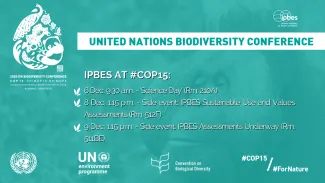
IPBES Announces Co-Chairs for 2-Year Business & Biodiversity Assessment & Host Institutions for new Technical Support Unit
Three leading global experts have been announced as co-chairs of the new IPBES business and biodiversity assessment, a methodological assessment of the impact and dependence of business on biodiversity and nature’s contributions to people. IPBES also announced the two institutions that will jointly host the technical support unit (TSU) for the assessment.
Professor Ximena Rueda Fajardo (Colombia), Matt Jones (UK) and Professor Stephen Polasky (USA) will lead a highly interdisciplinary team of expert authors, including practitioners, currently being selected by the IPBES Multidisciplinary Expert Panel – a process expected to be completed by the end of April 2023, when the selected experts will be announced on the IPBES website: www.ipbes.net
The co-chairs bring to the assessment a range of diverse backgrounds relevant to business and biodiversity: Ximena Rueda Fajardo is an Associate Professor at the School of Management at Universidad de los Andes, Matt Jones is the Head of Nature Economy at the UN Environment Programme World Conservation Monitoring Centre (UNEP-WCMC), and Stephen Polasky is Regents Professor and Fesler-Lampert Professor of Ecological and Environmental Economics at the University of Minnesota.
As is the case for all IPBES assessments, the report authors will receive technical, scientific and administrative assistance from a TSU. The IPBES Bureau has decided to accept the offer received from the Alexander von Humboldt Institute in Colombia as well as that from the UN Environment Programme World Conservation Monitoring Centre (UNEP-WCMC) in the United Kingdom to co-host the TSU, requesting the Alexander von Humboldt Institute to take the lead role in the consortium.
The Alexander von Humboldt Biological Resources Research Institute in Bogotá, Colombia, is an independent research institute linked to the Ministry of Environment and Sustainable Development of Colombia that conducts scientific research on biodiversity and generates the knowledge necessary to evaluate the state of biodiversity in the country.
UNEP-WCMC operates as a collaboration between the United Nations Environment Programme (UNEP) and the UK charity WCMC. It is a global centre of excellence on biodiversity and nature’s contribution to society and the economy, working at the interface of science, policy and practice.
Businesses depend on and benefit from biodiversity and nature’s contributions to people in various ways and to varying extents, with a range of positive and negative impacts on both biodiversity and nature’s contributions to people. Engaging businesses and the financial sector is essential to address the conservation of biological diversity, the sustainable use of its components, and the fair and equitable sharing of the benefits arising out of the utilization of genetic resources.
The IPBES assessment aims to categorize how businesses depend on, and impact, biodiversity and nature’s contributions to people and identify criteria and indicators for measuring this dependence and impact.
Expected to be considered for approval by the twelfth session of the IPBES Plenary in 2025, the two-year assessment will strengthen the knowledge base to support efforts by businesses to achieve the 2050 Vision for Biodiversity and the objectives of the Convention on Biological Diversity, and it will also support the 2030 Agenda for Sustainable Development global efforts to implement the Kunming-Montreal Global Biodiversity Framework agreed last year by the Parties to the Convention on Biological Diversity (CBD).






